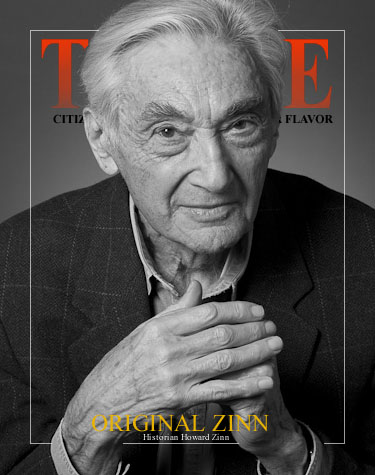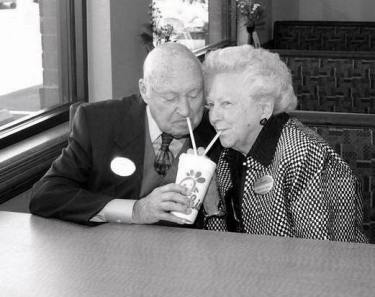
Volume VIII, Issue XI
The Problem of Original Zinn
Last week THYME asked the question: Could it be that the modern activist narrative, perpetuated by writers like Howard Zinn, conveniently ignores the sin, violence and retribution that lies outside of 'Western' activity. His 776 page A People's History of the United States [click to read] is required reading on many college campuses. No doubt, his philosophy has influenced many an aspiring journalist in their own activism. But Zinn must be seen for the Marxist that he is, and his convenient 'omission' of important history needs to be corrected.The problem is that Zinn, not sin, has become the basis for the activism of men like Sharpton and Jackson, who for the media serve as icons of the Civil Rights Movement.
First of all, it must be noted that Zinn himself admits: “Once I was bar mitzvahed, and I had done my religious duty, and my family needn’t be ashamed of me anymore…. that was the end of my religiosity.” He further perpetuates the marginalization of Faith in his works. Bob Cheeks [click to read] writes: "Rhetorician Richard M. Weaver in his essay, Up From Liberalism, explained the spiritual discernment that gave birth to his intellectual epiphany: “Original sin is a parabolical expression of the immemorial tendency of man to do the wrong thing when he knows the right thing.” By acknowledging Original sin, Weaver, abandoned a youthful dalliance with what at that time (the 1930’s) was called liberalism. Unfortunately, historian/activist Howard Zinn had no such epiphany."
The problem is not so much that Zinn has a narrative,but that the academy has embraced Zinn's one-sided narrative as a base for understanding our culture. Daniel J. Flynn sums it up quite nicely: "Who is the most influential historian in America? Could it be Pulitzer Prize winners Arthur Schlesinger, Jr. or Joseph Ellis or David McCullough, whose scholarly works have reached a broad literary public? The answer is none of the above. The accolade belongs instead to the unreconstructed, anti-American Marxist Howard Zinn, whose cartoon anti-history of the United States is still selling 128,000 copies a year twenty years after its original publication. Many of those copies are assigned readings for courses in colleges and high schools taught by leftist disciples of their radical mentor."
That is the problem. Steeped in the narrative that the world was doing fine before the evil white oppressors arrived on the scene, Zinn ignores the sin that has plagued men of all colors and cultures since long ago. Raiding and retribution were seen in tribal cultures and are still seen today in the tragic breakdown of civil society in places like Rwanda. Somehow the only real 'evil' in Zinn's world is that of the Western 'Imperialist.' That is why history, like mapmaking, requires an honest telling. Even America's Romantic period Romanticised the "Noble Savage." Indeed a lot of bloody raiding and retribution was left out even then. Ironically the best anti-colonial emergence of all, the American Experiment, is lumped in with the great empires of Spain and Britian.
No doubt, this is possible because men like Zinn see America as simply a continuation of European Imperialism. What is missed is the bright hope that burned briefly in newly freed African nations who initially modeled themselves after our Constitutional government. I remember that time in the middle of the Twentieth Century where Africans in traditional garb met in gleaming new assembly halls to take their rule from their former colonizers. That seemed such a time of hope and promise. Later I was saddened to see the destruction of Uganda, once known as the 'Pearl of Africa,' by despotic leadership feeding off of the bad feelings and retribution culture of the old tribalism. Rwanda's bloody descent was a terrible playing out of the same scenario.
But the United States Constitution actually acknowledges quite clearly the weakness of man and his propensity to take advantage of his fellows. Thus it enumerates basic rights held by all and limits the restriction of those rights by the institutions of government. Within the framework of Constitution, slavery, long a part of human history, becomes problematic in a way that allows the work of a William Wilberforce to go forward. But, as Bob Cheeks writes: "Zinn’s ideals have a misanthropic ring to them. I don’t believe he loves humanity as he claims. I believe he worships the idea of a state that can transform Americans into that antiseptic android, the socialist’s “New Man.” Perhaps he is angry with a G-d who would allow pain and suffering in this world?"
That last thought of Cheeks, so well dramatized in the movie: G-d's Not Dead [click to read], appears to drive far too much of the narrative at the academy. That would explain the steady stream of socialist solutions coming out of that world and their antipathy for localized initiative outside of government oversight, as in the case of healthcare reform. It may be seen as well in the state's resistance to Faith-based solutions and the desire of the state to create 'compelling public interest' legislation to force businesses run by people of Faith (Hobby Lobby, Conestoga Wood Products) to provide coverage of abortion causing drugs or prohibiting them from refusing service to those who would force them, in providing such service, to violate their conscience (Elane Photography, Sweet Cakes by Melissa). Such is in keeping with the molding of the "antiseptic android," the "New Man." It can be no less than that.
Remembering September 11, 2001
Where Were You (When The World Stopped Turning)
Alan Jackson
Where were you when the world stopped turning on that September day?
Were you in the yard with your wife and children
Or working on some stage in L.A.?
Did you stand there in shock at the sight of that black smoke
Risin' against that blue sky?
Did you shout out in anger, in fear for your neighbor
Or did you just sit down and cry?
Did you weep for the children who lost their dear loved ones
And pray for the ones who don't know?
Did you rejoice for the people who walked from the rubble
And sob for the ones left below?
Did you burst out in pride for the red, white and blue
And the heroes who died just doin' what they do?
Did you look up to heaven for some kind of answer
And look at yourself and what really matters?
I'm just a singer of simple songs
I'm not a real political man
I watch CNN but I'm not sure I can tell
you the difference in Iraq and Iran
But I know Jesus and I talk to God
And I remember this from when I was young
Faith, hope and love are some good things He gave us
And the greatest is love
Where were you when the world stopped turning on that September day?
Were you teaching a class full of innocent children
Or driving down some cold interstate?
Did you feel guilty 'cause you're a survivor
In a crowded room did you feel alone?
Did you call up your mother and tell her you loved her?
Did you dust off that Bible at home?
Did you open your eyes, hope it never happened
Close your eyes and not go to sleep?
Did you notice the sunset the first time in ages
Or speak to some stranger on the street?
Did you lay down at night and think of tomorrow
Or go out and buy you a gun?
Did you turn off that violent old movie you're watchin'
And turn on "I Love Lucy" reruns?
Did you go to a church and hold hands with some strangers
Did you stand in line and give your own blood?
Did you just stay home and cling tight to your family
Thank God you had somebody to love?
I'm just a singer of simple songs
I'm not a real political man
I watch CNN but I'm not sure I can tell
you the difference in Iraq and Iran
But I know Jesus and I talk to G-d
And I remember this from when I was young
Faith, hope and love are some good things He gave us
And the greatest is love
Where were you when the world stopped turning that September day?
Lower Manhattan, New York, New York. Photo by Detective Greg Smedinger
Arlington, Virginia.
Shanksville, Pennsylvania.
The Southeast Reliability Project

"There are no simple solutions, only intelligent choices." -- Caterpillar Advertisement.
Intelligent Choices, that was the message of a series of advertisements by construction equipment giant Caterpillar in the 1960's. Of course Caterpillar had a vested interest in the construction industry moving forward, but the thought is a good one. Augusta County, Virginia now faces the need, in the case of Dominion Resources' 42 mile proposed pipeline route through the county, to make some intelligent choices.
"Pipelines tear up the land..." "Affordable Energy requires pipelines." Those could be the conflicting sentiments in today's discussion, much like the opposing viewpoints highlighted in the Caterpillar advertisements. And they can guide us, as we consider the impact and opportunity of any project. A badly designed pipeline route will indeed affect us for years to come, but design is a beautiful process and through intelligent considerations we might indeed arrive at a very workable solution.
The first map of the proposed route simply cut across the expanse of George Washington National Forest without regard for terrain or sensitive natural areas. A second map corrected the route to reflect concern for sensitive areas in the National Forest, but cut a swath through the growing community of Stuarts Draft. The pipeline mappers now had created conflict with the county's comprehensive plan. Supervisor David Karaffa also pointed out the need to protect important underground aquifers in the Stuarts Draft area. Obviously more design is in order.
Pipelines are easiest to site in open country. After they are buried and the land is restored you can indeed farm right over them. They are problematic where there is heavy development. They require an open right of way where only roads may cross them and no structures may be placed over them. It might surprise you to know that a gas pipeline runs right through the Virginia Horse Center Complex outside of Lexington Virginia. At one point the center's designers considered covered walkways from stables to arenas and were stopped by the need to leave pipeline right of way uncovered.
Pipelines are least desirable where there is a dense community or in natural preservation areas. The 100' right of way MUST be maintained clear in order to perform necessary inspection and maintenance. Thus it is imperative that the route be sensitively threaded through the mountains by its designers. But that is certainly possible. Just North of Calf Mountain Shelter on the Appalachian Trail, one first crosses a very obvious swath cut for power line right of way. The electricity crackles in the lines overhead, supported by enormous towers... it is a bit eery... but walk a bit farther and you step into what appears to be a wildlife clearing just past Jarman's Gap. Wildflowers and butterflies abound.
You leave the trail and walk to the edge to take in the view a little better. Only then do you realize you are standing on a natural gas line right of way! You can see now that the cleared path extends on past the end of Buck's Elbow Mountain, far in the distance. I grew up with gas lines. In fact, as a boy I walked to my favorite lake, Triadelphia Reservoir, on the gas line right of way. The gas line actually ran right under the reservoir!
One resource I still have from my younger days is a copy of Ian McHarg's 1967 book: Design with Nature. It is a great guide to intelligently siting projects with sensitivity to their environment. McHarg used a series of semi-transparent overlays on which important natural features, historically important sites and existing communities are all colored in. The result of analyzing the composite of McHarg's overlays is the most environmentally responsible design. Such is the process we must insist be applied to the Southeast Reliability Project.
Samuel Truett Cathy: 1921-2014

Samuel Truett Cathy.
No goal is too high if we climb with care and confidence.”
“Nearly every moment of every day we have the opportunity to give something to someone else – our time, our love, our resources. I have always found more joy in giving when I did not expect anything in return.”
“I’d like to be remembered as one who kept my priorities in the right order. We live in a changing world, but we need to be reminded that the important things have not changed, and the important things will not change if we keep our priorities in proper order.”
“You have to be very careful about what you say. More importantly, you have to be very careful about what you do. You never know how or when you influence people – especially children.”
“It is when we stop doing our best work that our enthusiasm for the job wanes. We must motivate ourselves to do our very best, and by our example lead others to do their best as well.”
“I believe no amount of business school training or work experience can teach what is ultimately a matter of personal character. Businesses are not dishonest or greedy, people are. Thus, a business, successful or not, is merely a reflection of the character of its leadership.”

No comments:
Post a Comment